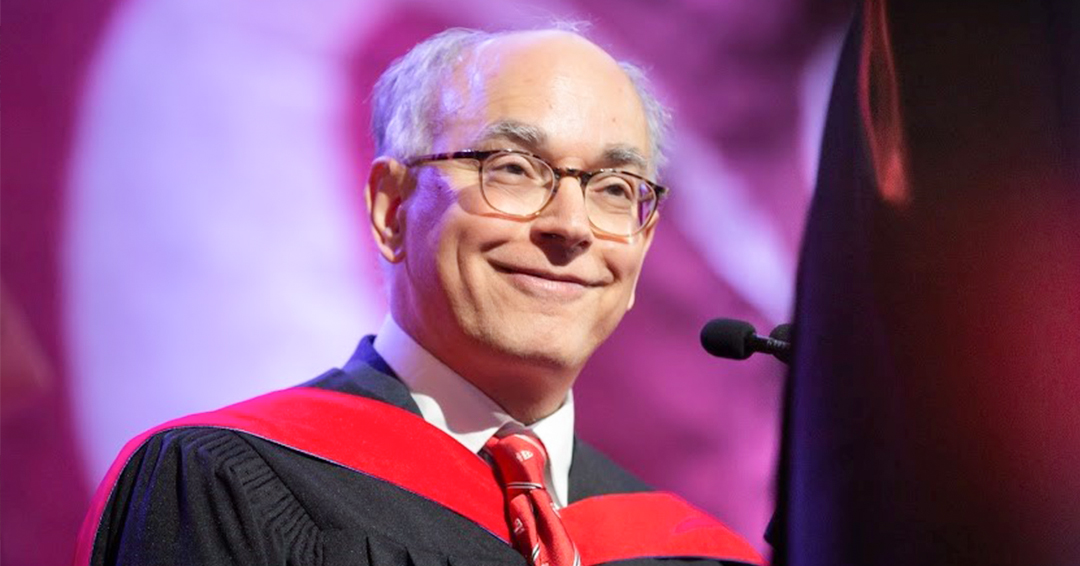
Samuel Benaroya, MDCM, is stepping down from his role as Associate Vice-Principal and Vice-Dean of Health Affairs, FMHS, after serving close to eight terms in the Faculty. We spoke to Dr. Benaroya—who was recently named the inaugural co-recipient of McGill’s Morty Yalovsky Lifetime Achievement Award for Excellence in Academic Leadership—about his time at the University, how the Faculty has changed over the last quarter century and his plans for the next “less–full–time” chapter in his career.
You have served an incredible eight terms in a leadership role in the Faculty of Medicine and Health Sciences. Looking back, could you share a few of your proudest moments?
Having worked almost a quarter century in this position, one of the most gratifying goals that I had the opportunity to help advance was to position McGill as a full partner and contributor to the Quebec health care system, both in education and in clinical care. It was very important to me to represent McGill in this way to our partners throughout Quebec and to show that it is not an isolated entity.
Can you tell us more about those partnerships?
We have had many successes, such as the development of Campus Outaouais and the partnership with the Université du Québec à Chicoutimi. With respect to the latter, our School of Physical & Occupational Therapy supported the development of a physiotherapy program to serve the population in that region. And, of course, there is RUISSS McGill, which is an excellent example of developing strong links with the partner regions to help promote educational initiatives and support clinical care locally.
How do you see McGill’s role in health care delivery and education in Quebec in the years to come?
While difficult to predict, it certainly involves going beyond hospital-based care and education. We are moving to a more distributed learning model, and we will be using technology in ways we cannot yet imagine. We’re also going to use new modes of clinical teaching that do not necessarily involve real patients, but instead use more simulation and other innovative technologic tools.
How has the Faculty, and health care system, changed over the years, and how have you adapted your work in consequence?
My role in the Faculty changed significantly over time. I have worked with three Deans—four if I count myself as Interim Dean in 2011! I’ve enjoyed positive, constructive relationships with all of the Deans and my Faculty colleagues, as we worked together to achieve the Faculty’s many academic objectives. This is another source of pride for me.
Regarding the Faculty and health care landscape, in medical education we have evolved from a hospital-based training model to one that spans Quebec. Going forward, teaching at a distance will play a greater role.
I would also say that, for the Faculty, in addition to its historical mandates of teaching, research and clinical care, a fourth aspect has grown in importance: social responsibility, taking into account the specific sensitivities and needs of the populations we serve.
What do you hope your legacy will be?
A major benefit of being in this position for a long time was developing credibility with many different partners across the province, from clinical and educational leaders to government ministries. With all these linkages, I hopefully was able to make a contribution in a number of impactful initiatives.
I would like to see the partnerships and outreach activities that McGill has cultivated over the last number of years continue and grow, and McGill’s place in our local society and in Quebec become a source of pride for all concerned.
Do you have any words of wisdom you’d like to impart to your successor, Jean-Pierre Farmer?
From my own experience, I would say it is very important for anyone assuming a leadership role to have clear long-term objectives, to be patient and persistent as you work toward your vision, and to enjoy the mandate.
What’s next for you?
My responsibilities and time commitment at the Faculty will be less, of course, but I am continuing as coordinator of RUISSS McGill and serving as an advisor to Dean Eidelman. I’m also continuing my clinical practice one day per week – I very much appreciate interacting with patients that I’ve known a long time.
One of the challenges after you’ve been working hard for a long period of time, and enjoying it, is to ask yourself, what will you do going forward? I think it’s very difficult to stop completely, all of a sudden, so proceeding in a gradual fashion makes sense to me. I do have more time now for myself and my family, and for pursuing other interests – so, the best way to describe “what’s next” is: I will be working “less full-time” than before!
Related:
Samuel Benaroya receives lifetime achievement award from McGill
